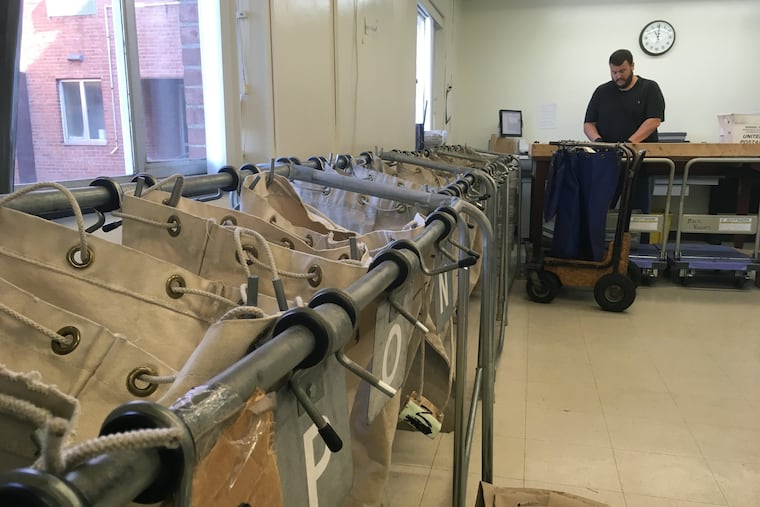Mail is a lifeline for incarcerated people. Why is Pennsylvania blocking it? | Opinion
Instead of getting the physical letters, cards, and drawings that are a vital bridge to their families and communities, the 37,000 people incarcerated in Pennsylvania receive scanned copies.

Prisons wreak havoc on mental health — the isolation, chaos, and daily humiliations of life behind bars cause emotional scars that can take years to heal. To stave off depression, many incarcerated Americans rely on mail from loved ones. Letters from home were so important to Johanna Mills — a formerly incarcerated woman and prisoners’ rights advocate in Southern California — that she would stuff them inside her pillow. “There were many times when I was on the brink while locked up,” she told me. “Those letters kept me going.”
» READ MORE: ‘I feel hopeless’: Families call new Pa. prison mail policy devastating
But prison mail is being threatened. Corrections agencies nationwide are adopting measures to deprive incarcerated people of their letters. Some of the most troubling policies have been enacted in Pennsylvania. In 2018, the state’s Department of Corrections announced that it was scrapping traditional mail delivery in favor of a privately run service called MailGuard. Under MailGuard, run by tech company Smart Communications, incoming correspondence is scanned and converted to digital files. Instead of getting the physical letters, cards, and drawings that are a vital bridge to their families and communities, the 37,000 people incarcerated in Pennsylvania receive scanned copies. The quality of the copies is so poor that text is often impossible to read. Photos are pixelated to the point that the people in them — friends, parents, children — are unrecognizable.
One person who has been deeply affected by Pennsylvania’s MailGuard program is a man whose name I’ll withhold to protect his privacy. Since his incarceration more than a decade ago, he has depended on mail to maintain connections with friends on the outside. In a letter to my organization, Just Detention International, he wrote that mail “can be the tipping point between living and suicide.” Since Pennsylvania contracted with Smart Communications to eliminate physical letters, his mental health has deteriorated. The crude printouts he receives do not come close to matching the warmth of the original letters. A number of his friends stopped writing him altogether, as have others with loved ones in Pennsylvania’s prisons. Understandably, many people don’t want to send letters they know will be destroyed, or they have concerns about surveillance. Vice News reported in March that Smart Communications has used scanned mail to build a searchable database of prisoner correspondence — a frightening prospect for anyone, but especially for families who have already been harmed by the criminal legal system.
» READ MORE: If Pennsylvania corrections officers don’t want the vaccine, they should look for new jobs | Solomon Jones
Pennsylvania officials have defended the MailGuard program on security grounds, claiming it stops drugs from entering prisons. But this claim is spurious. The rate of positive drug tests hardly budged after MailGuard was added, validating the belief among many experts that contraband is mostly smuggled into prisons by staff. Overall, Pennsylvania spent $15 million in taxpayer money for a prison mail scanning program that is not only cruel but also doesn’t work.
Pennsylvania could have severed ties with Smart Communications earlier this month when the company’s contract expired. But MailGuard is still in place in the state’s prisons — though for how long and at what cost is unclear. The state’s Department of Corrections hasn’t publicly announced whether Smart Communications’ contract has been renewed. Whatever the program’s status, Pennsylvania must end MailGuard and return to normal, physical mail service.
What happens in Pennsylvania will have far-reaching implications. While MailGuard operates in 110 jails across 25 states, the real prize is its pilot program with the massive Bureau of Prisons, an agency run by the U.S. Department of Justice. Advocates have drummed up plenty of opposition to the federal government’s use of MailGuard. If Pennsylvania — where the program launched — drops the system, it would lend momentum to this fight.
Both President Joe Biden and Pennsylvania Gov. Tom Wolf have emphasized the need to rebuild families and communities devastated by mass incarceration. Supporting a program like MailGuard is not consistent with this vision. Johanna Mills has thrived since her release from prison. Pennsylvania and the federal government should look to her story as an example of why mail matters.
Linda McFarlane is the executive director of Just Detention International, a health and human rights organization that seeks to end sexual abuse in all forms of detention.